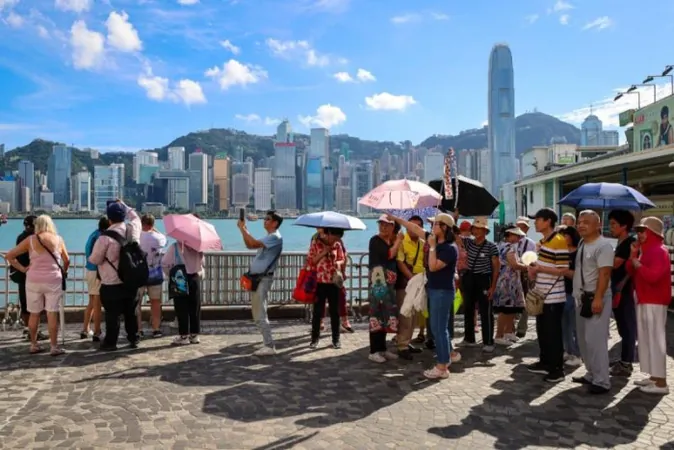
Will Hong Kong Ever See Pre-Pandemic Visitor Numbers? Experts Weigh In!
2024-09-30
Author: Ting
As Hong Kong continues to navigate the aftermath of the COVID-19 pandemic, a recent report indicates that the influx of mainland Chinese visitors is unlikely to bounce back to pre-pandemic figures within the next two years. The Travel Industry Council's executive director, Fanny Yeung Suk-fan, revealed these insights during a television appearance, shedding light on the changing dynamics of tourism in the city.
Current Visitor Trends
During the upcoming National Day holiday from October 1 to October 7, an estimated 1.15 million to 1.2 million mainland visitors are expected in Hong Kong, marking a 20% increase from last year. However, this number only accounts for approximately 75% of the visitors recorded in 2018, highlighting significant ongoing challenges.
Yeung emphasized that the recovery is hindered primarily due to worsening economic conditions both globally and within mainland China. Concerns about household spending are causing potential travelers to think twice about their travel plans. Moreover, a noticeable shift in tourist behavior has emerged, with shopping no longer being the primary motivation for visits, suggesting a need for Hong Kong to adapt its offerings.
Year-to-Date Performance
Despite welcoming 23 million mainland visitors in the first eight months of this year—an impressive year-on-year increase of about 39%—Yeung expressed skepticism regarding the recovery trajectory in the coming years.
Industry Challenges
An interesting aspect of the tourism landscape in Hong Kong is the pressing shortage of qualified tour guides, particularly those proficient in foreign languages such as Thai and Russian. Yeung has been vocal about the need for the government to consider relaxing the licensing requirements that currently restrict entry into the profession for non-university graduates. Currently, aspiring tour guides must complete a six- to eight-week course and pass an exam, which may deter many enthusiasts.
She proposed that university students be allowed to take up part-time roles as tour guides and suggested an expansion of the Vocational Professionals Admission Scheme to include the tourism sector. This initiative aims to attract skilled professionals to boost the talent pool for Hong Kong and the Greater Bay Area.
Emerging Opportunities
Amid these challenges, Yeung also expressed optimism about the potential of the so-called 'panda economy.' The recent birth of a pair of panda twins at Ocean Park has sparked excitement, particularly with the city also receiving complimentary pandas from Beijing. These lovable creatures have become a significant draw for tourists, and Yeung believes there's untapped potential in commercializing panda-themed merchandise and experiences.
In line with this, she advocated for longer-term strategies to cultivate a widespread affection for pandas among Hong Kong residents, emphasizing the need for initiatives like panda-themed dining experiences and creative media.
Future Prospects
Furthermore, as the Kai Tak Sports Park is set to debut next year, Yeung foresees it driving increased activity at the nearby cruise terminal. This new venue could host concerts and events that would benefit not only local tourism but also provide travelers with exciting experiences post-cruise.
Conclusion
In conclusion, while the outlook for mainland visitor numbers remains restrained, Hong Kong's tourism industry is striving to adapt to new consumer behaviors and leverage unique attractions to rejuvenate its appeal. As the city embraces innovative ideas and collaborative government support, the hope is that it will pave the way for a vibrant and sustainable tourism future. Stay tuned to see how these changes unfold and the impact they may have on Hong Kong's economy!


 Brasil (PT)
Brasil (PT)
 Canada (EN)
Canada (EN)
 Chile (ES)
Chile (ES)
 España (ES)
España (ES)
 France (FR)
France (FR)
 Hong Kong (EN)
Hong Kong (EN)
 Italia (IT)
Italia (IT)
 日本 (JA)
日本 (JA)
 Magyarország (HU)
Magyarország (HU)
 Norge (NO)
Norge (NO)
 Polska (PL)
Polska (PL)
 Schweiz (DE)
Schweiz (DE)
 Singapore (EN)
Singapore (EN)
 Sverige (SV)
Sverige (SV)
 Suomi (FI)
Suomi (FI)
 Türkiye (TR)
Türkiye (TR)